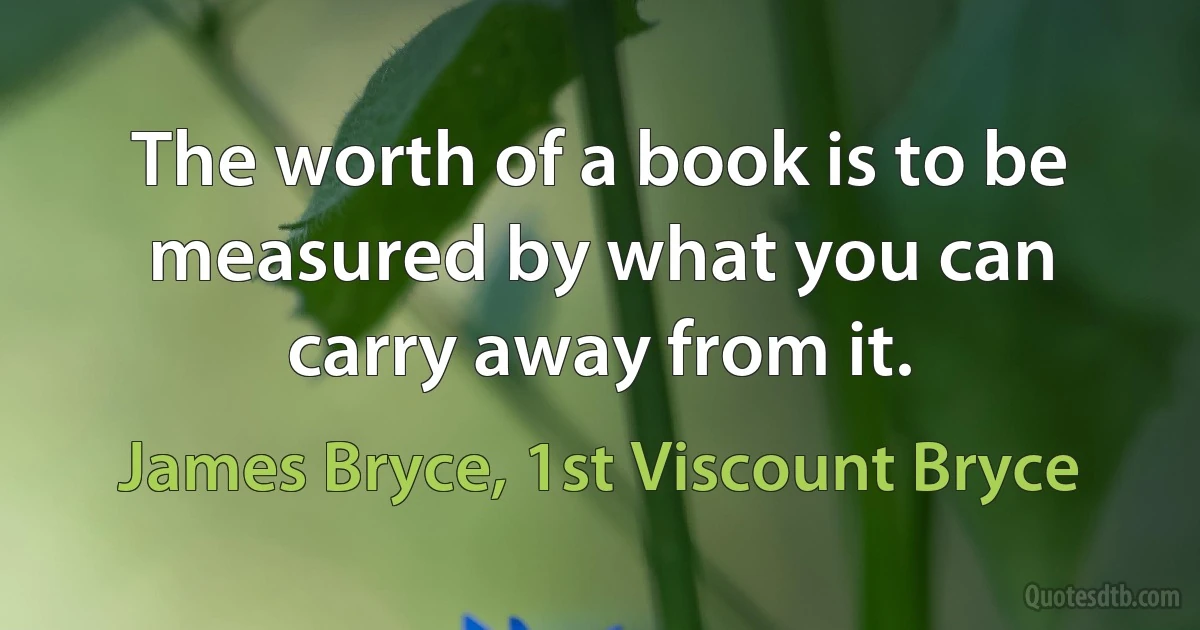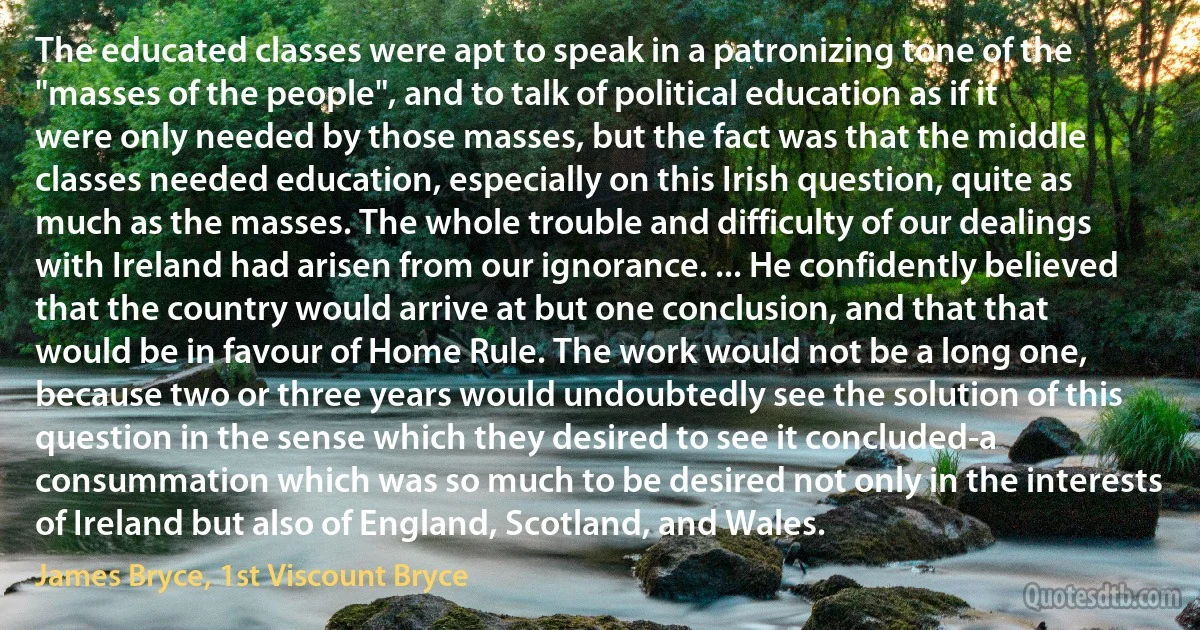James Bryce, 1st Viscount Bryce quotes
...there had been many changes in the national ideals in this country during the past 50 years. ... liberty, so far as it regarded political power, freedom of opinion, and freedom of action, was rather more in men's minds in the fifties as an essential element in the making of national happiness and well-being than it was in the present day. ... Republicanism was then a thing much talked of in England. It was curious to note how completely that had gone, and the discovery made that the true enemy of liberty and democracy was not a monarchy, but money, and the power that money exerted.

James Bryce, 1st Viscount Bryce
The United States are deemed all the world over to be pre-eminently the land of equality. This was the first feature which struck Europeans when they began, after the peace of 1815 had left them time to look beyond the Atlantic, to feel curious about the phenomena of a new society. This was the great theme of Tocqueville's description, and the starting-point of his speculations; this has been the most constant boast of the Americans themselves, who have believed their liberty more complete than that of any other people, because equality has been more fully blended with it.

James Bryce, 1st Viscount Bryce
What was a reasonable offer? In the first place, there ought to be an amnesty. ... The second point in the terms should be a grant of money to rebuild the burned homesteads and restock the devastated farms. ... Nothing would do more to accelerate the return of peace and order than to give the people occupation and a chance of living. Then, it should be part of any reasonable offer to the Boers that there should be a speedy restoration of self-governing institutions.

James Bryce, 1st Viscount Bryce
He had said from the first that the war had been a hideous blunder, and he had supported that opinion in the House of Commons. (Cheers.) ... Stop the farm-burning; it had been a great mistake and was against British ideas. (Cheers.) Recognize that they were dealing with men whose bravery and tenacity they could admire, and offer terms to the representatives of the two Republics and to the burghers who were now in arms.

James Bryce, 1st Viscount Bryce
Having condemned the policy of severity which had been adopted with the object of bringing the [Boer] war to a conclusion, he said that it might be doubted whether anything short of the restoration of the independence of the two Republics-subject of course to a measure of British control-would have the effect of inducing the Boers to lay down their arms. The passion for independence was strong; it had been the cherished ideal of those people ever since they quitted Cape Colony and won the country for themselves. Our demand for unconditional surrender was a fatal blunder.

James Bryce, 1st Viscount Bryce
With the old ideal of liberty there was a great and urgent passion for freedom of opinion and freedom of speech. In the present day we cared very much less for freedom of opinion as an element in our national life than we did in those days. But we ought always to be on our guard against giving the smallest encouragement to any attempt of any kind of any dominant party to put down the free expression of anything which was not criminal.

James Bryce, 1st Viscount Bryce
In how many and which of these senses of the word does equality exist in the United States? Not as regards material conditions. Till about the middle of last century there were no great fortunes in America, few large fortunes, no poverty. Now there is some poverty (though only in a few places can it be called pauperism), many large fortunes, and a greater number of gigantic fortunes than in any other country of the world.

James Bryce, 1st Viscount Bryce
Liberalism was a plant which did not thrive in stagnant waters, and the waters of London, to their shame be it spoken, were stagnant. Where there was a want of active zeal all the worse and baser instincts which had power in politics told against the Liberal party. (Cheers.) The money power was against the Liberal party, and so was the liquor power.

James Bryce, 1st Viscount Bryce
[Bryce] thought she [Russia] was becoming a menace to Europe with her vast and rapidly increasing population and her also rapidly increasing prosperity. The Duma was no check on the ambitions of the official class. Germany, he thought, was right to arm and she would need every man.

James Bryce, 1st Viscount Bryce
I venture to hope that...the Government will approach the question with a desire to deal in the most liberal manner they can with Ireland, and to give her, if need be, more than justice requires, in order that we may bring about peace. That would be good policy in the long run.

James Bryce, 1st Viscount Bryce
In those days it was thought that only through the principle of nationality could freedom be established, and here, again, the changes which had happened had made this ideal seem less needed than it was. The principle of nationality was held to make for peace and was quite consistent with cosmopolitanism, which played a leading part in conceptions of what was needed for the happiness of the world. There was rather more in the old ideals of the moral element and less of the material element than there was to-day; there was, too, rather more of a sanguine spirit, and the golden age seemed nearer then it seemed now.

James Bryce, 1st Viscount Bryce
When repeated experiments have failed, when every policy that has been proposed as a remedy for the ills of Ireland has been tried in succession and found wanting, is it not time to try some other experiment? I think the only experiment that can be tried is to make the Irish people masters of their own fortunes. Throw responsibility upon them, make them feel that it is to their interest to preserve law and order. Make them feel that the laws they are to obey are laws made by themselves, and that if they adopt a policy it will not be reversed by people sitting at Westminster, who have not that intimate knowledge of Irish conditions and wishes which can be possessed only by those who live in the midst of the people.

James Bryce, 1st Viscount Bryce
The danger which threatened the natives in the future, at any rate in the mining districts, would arise from the desire to obtain a constant and cheap supply of native labour for the mines. It would be the duty of those in authority to guard the native against the oppressive laws which were in force in the Dutch Republics. In conclusion, he protested against a policy of harshness and violence in South Africa. We should try to inculcate forbearance, wisdom, and the generosity into the minds of those who had the government of the country.

James Bryce, 1st Viscount Bryce
One of the most remarkable changes was the extent to which indifference had come to prevail in matters of religious opinion. With regard to freedom of action, there would have been a stronger objection then than there was now in allowing the great majority of persons engaged in any particular trade to coerce the minority into their wishes. On the question of non-interference, he pointed out that the difficulties of laissez faire were now far more generally recognized than they were 40 or 50 years ago. For one reason or another there was now far less disposition to accept the doctrines of laissez faire than there was then, and they played a much smaller part in the ideal we formed of what was good for a nation.

James Bryce, 1st Viscount Bryce



